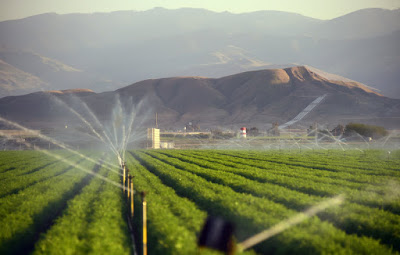

| Online: | |
| Visits: | |
| Stories: |

| Story Views | |
| Now: | |
| Last Hour: | |
| Last 24 Hours: | |
| Total: | |
California’s chronic water shortage does not bode well for its agriculture
By Jay Famiglietti and Michelle Miro* for the Los Angeles Times, March 7, 2017
[….] All winter, Californians have been asking one question: Is the drought finally over? The federal monitor shows just a few lingering tan and yellow patches in Southern California, but for scientists, the beginning and end of drought conditions are exceptionally difficult to pinpoint. Still, after only a few more serious encounters with the ‘Pineapple Express,’ Gov. Jerry Brown may well declare the state’s 3-year drought emergency over.
Which leads us to the second most frequently asked question of this unusually wet winter: What’s our water future? The answer has been clear for a while: It’s going to be a lot like our water past, but more so — California is, was and will be chronically water short.
The drought has underlined three important realities that aren’t going to change. First, the way municipalities use water can be sustainable, even as their population grows, as long as they embrace conservation, water recycling and reuse, and a diverse portfolio of management options. However, agricultural water use at today’s scale in California is not sustainable. Agriculture is literally sucking the state dry.
Food production requires nearly unfathomable volumes of water, and has resulted in the long-term decline of the total available fresh water in California. The great thirst of our highly productive agricultural sector has never been and will never be satisfied by the annual winter storms that feed the state’s rivers and reservoirs. The shortfall is met by pumping groundwater at rates that greatly exceed those of replenishment. As a result, groundwater levels in much of the state, including the once-vast reserves beneath the Central Valley, have been declining for nearly a century.
It is essential to understand that wet winters like the current one will not reverse this long-term decline. Historically, even the wettest multiyear periods result in only a modest uptick in the otherwise steady loss of Central Valley groundwater. Consequently, agriculture in California has to adapt to this dwindling supply. Farmers and ranchers will face more of the kinds of difficult decisions the drought has already forced, such as fallowing fields as groundwater levels drop, or worse, taking land out of production. [emphasis added]
Next, we must recognize that the classic definition of water as a sustainable resource — that is, using only the surface and groundwater available on an annual, renewable basis — is no longer tenable for the entire state. Instead, water sustainability in California must now refer to efforts to slow the rate of disappearance of the state’s groundwater reserves.
The landmark Sustainable Groundwater Management Act, passed in 2014 in Sacramento, acknowledges and confronts the declining availability of fresh water in California. Its requirements, however, will never result in the recovery of statewide groundwater levels, even if important efforts to enhance groundwater recharge and construct additional storage are pursued.
Finally, it is simply impossible to effectively plan for California’s water future without knowing a lot more about how much water the state has, how much it needs and how these amounts are changing with time. [….] The entire article is here.
* Jay Famiglietti is a hydrologist and former professor of Earth system science and of Civil and Environmental Engineering at UC Irvine. Michelle Miro is a hydrologist and doctoral candidate in civil and environmental engineering at UCLA.
Photo: Frederic J. Brown/AFP/Getty Images
Source: http://aglaw.blogspot.com/2017/03/californias-chronic-water-shortage-does.html



